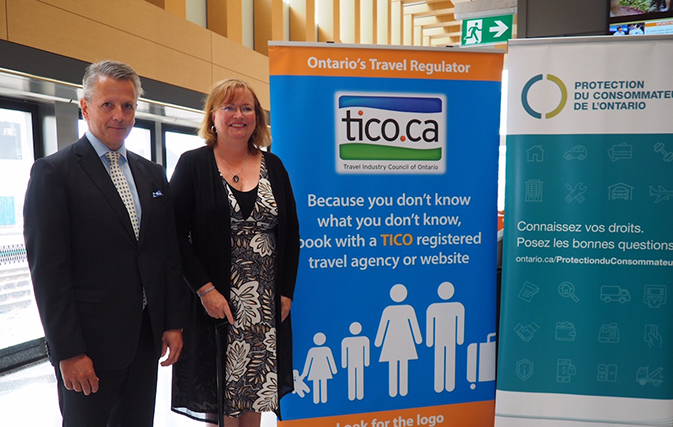TORONTO — The Ontario government is giving consumers 2 weeks to weigh in proposed changes to the province’s Travel Industry Act, including Compensation Fund contributions direct from the travelling public, changing the classes of registrants in order to create a class for travel sellers (currently travel agent and wholesaler) and another class for individual travel counsellors, and requiring registered travel counsellors to meet continuing education requirements.
Phase 2 of the government’s report is now available for consumer consultation at Ontario.ca/TravelActReview (and also available at tico.ca). The deadline for consumer input is July 24.
Tracy MacCharles, Minister of Government and Consumer Services, held a press conference at Toronto’s UP Express terminal at Union Station this morning, together with Richard Smart, President & CEO of TICO, to alert the consumer media about the proposed changes and opportunity for consumer input.
MacCharles noted that all-in pricing, which came into effect Jan. 1, 2017 was the first of many changes that consumers will see in the travel industry. “All-in pricing provides transparency and reduces confusion for consumers in Ontario who are looking to book vacations,” she said. “Our government is committed to further strengthening consumer protection in the travel industry, that is why we are reviewing the Travel Industry Act and encourage people from across the province to participate in the consultations.”


With the July 24 deadline she said he Ministry of Government and Consumer Services (MGCS) is now seeking consumer input on proposals for possible changes to the Travel Industry Act, 2002 (TIA) and O. Reg. 26/05, which govern travel agents and wholesalers.
“MGCS has been undertaking a detailed review of TIA to consider how the marketplace has evolved since TIA was last reviewed in 2002 and whether reforms are needed to better protect consumers who purchase travel services in Ontario. Some rules may be outdated and place an unnecessary burden on businesses that sell travel services in Ontario.”
The proposals for possible changes are intended to:
- Strengthen consumer protection;
- Reduce the regulatory burden on registrants; and
- Improve regulatory efficiency
Proposals for possible changes include:
- Changing the classes of registrants in order to create a class for travel sellers (currently travel agent and wholesaler) and another class for individual travel counsellors;
- Strengthening advertising requirements for travel agents and wholesalers who are based outside of the province, but are targeting their advertising of travel services to Ontarians, by requiring them to follow the province’s rules regarding representation (advertising) regardless of where they are located;
- Introducing new disclosure requirements for registrants, including displaying the TICO logo in a prominent manner on all advertisements for travel services prior to purchase, and requiring that they disclose additional information to consumers, such as coverage available under the Travel Industry Compensation Fund;
- Amending registrant requirements to update the financial reporting, trust accounting, working capital, security deposit, and place of business requirements;
- Granting the Travel Industry Council of Ontario (TICO) the authority to issue administrative monetary penalties, and expanding TICO’s inspection powers with respect to non-registrants; and
- Enabling the potential development of an expanded Travel Industry Compensation Fund with contributions directly from consumers subject to additional research and consultations with consumers to determine whether to introduce an expanded model.
“The ministry welcomes feedback and encourages anyone interested to provide comments on the proposals outlined in the Phase 2 report.”
At the consumer press conference MacCharles noted that in 2016 up to 79% of travel bookings were made online.
“We are very pleased to be working with the government on its comprehensive review of Ontario’s Travel Industry Act and Regulation,” said TICO’s Smart. “Along with the recent introduction of the all-in pricing requirement, we are pleased with the prospect of further modernization to the legislation to enhance consumer protection in the province as well as lessen burden to business.”

